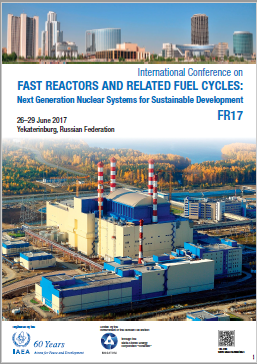Speaker
Mr
Chirayu Batra
(IAEA)
Description
Committed to the sustainability and addressing the technology progression, the IAEA provides support to the Member States covering all technical aspects of current, evolutionary and innovative fast reactors and subcritical hybrid systems R&D, design, deployment, and operation. The IAEA has been carrying out a dedicated fast reactor knowledge preservation initiative since 2003.
The main objectives of the initiative are to, (a) halt the information related to Fast Reactors (FR), and (b) collect, retrieve, preserve and make accessible existing data and information on FR in the dedicated Fast reactor Knowledge Portal (FRKP). The interest for this initiative has been reconfirmed at several technical meetings held in this area along with a constant support from the IAEA technical working group on fast reactors.
The portal incorporates the existing set of knowledge and information and also provides a systemic platform for further preservation of new developments. The FRKP is capable to control and manage both publicly available as well as controlled information. In the portal a taxonomy based search tool is implemented, which helps using new semantic search capabilities for improved conceptual retrieve of documents.
The FRKP includes fast reactor document repositories (approximately 30.000 documents), project workspaces for the IAEA’s coordinated research projects, technical meetings, forums for discussion and databases.
One of these databases is “A catalogue of facilities in the IAEA member states in support of development and deployment of liquid metal cooled fast neutron systems (LMFNS catalogue)”. This newly developed living database in its current form presents an overview and detailed information on 150 experimental facilities in 14 IAEA Member States, currently operating, being designed or under construction, in support of the development and deployment of the innovative LMFNS, both critical and subcritical.
The LMFNS Catalogue contains data on 79 facilities in support of development of sodium cooled fast reactors (SFR) and 71 facilities in support of lead/LBE cooled fast reactors (LFR). Besides, the facilities in support of SFR and LFR there are a few dual-application facilities in support of both designs. An overview and detailed facility profiles are reported and classified according to the reactor type, their most relevant research fields. Multiple choice filtering and sorting are available.
By providing the end-users with detailed information on existing and future experimental facilities able to support innovative LMFNS, the open LMFNS database will facilitate cooperation between organizations with an active programme on these nuclear energy systems.
Country/Int. Organization
International Atomic Energy Agency (IAEA), Vienna, Austria
Author
Dr
Mikhail Khoroshev
(IAEA)
Co-authors
Mr
Chirayu Batra
(IAEA)
Dr
Vladimir Kriventsev
(IAEA)

